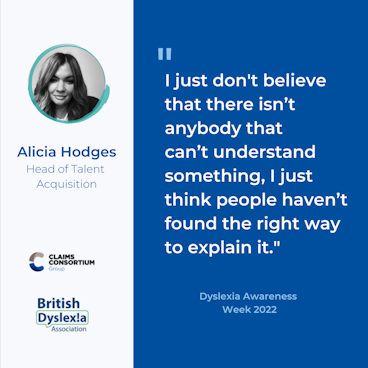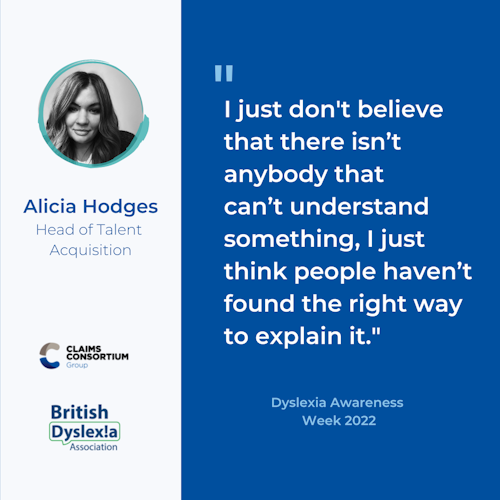Dyslexia Awareness Week 2022 – A Sit Down with Our Head of Talent Acquisition
3rd October 2022

This year, the focus of Dyslexia Awareness Week is breaking through barriers and looking at what we can do to ensure those with dyslexia thrive.
We sat down with our Head of Talent Acquisition Alicia Hodges to discuss her experience with dyslexia and how Claims Consortium Group has supported her throughout her career.
When did you first find out you had dyslexia?
Throughout school, I always struggled, particularly with spelling, writing reports and working with numbers. It got to a point where I stopped wanting to ask questions or get involved in class because of the reaction I would get from others, basically telling me I was stupid.
In Year 9, my tutors advised me they thought I was dyslexic and should take a test, for whatever reason I never ended up taking one, so I, somehow, got through my GCSEs without any additional support. It wasn’t until I started college that I was officially tested and told I had dyslexia and dyspraxia.
What was it like having it confirmed?
At the time I remember thinking how it made a lot of sense, it was nice to have a reason why I’d struggled at school, but at the same time I didn’t really know what to do with the information.
All the support available was very specific, being given extra time, and having someone sit with you, I had no idea how that would help me, so I never did anything with it, but that all changed when I started working at Claims Consortium Group.
What was it that changed when you joined Claims Consortium Group?
I’d done some research about the company and had seen how Jeremy Hyams, the Founder and Executive Chair, had dyslexia and how openly he shared his experiences.
It gave me the courage to tell my line manager I was dyslexic, something I had never done before. Straight away they asked what they could do to support me, once I explained my areas of struggle, my line manager and my team went above and beyond to help.
What impact does dyslexia have on you?
I think struggling with spelling is an obvious one, but also for me, it’s very much how I process things, that could be words, numbers, starting a new task, or understanding what’s in front of me. It can be incredibly frustrating, feeling like your head’s full of fog, when you know the answer should be simple but it’s just not clicking.
How have Claims Consortium Group supported you?
Accepting my dyslexia is still very much a journey for me, but I can now talk about it without any shame or embarrassment and that is 100% down to the support I have received from my team and the environment Claims Consortium Group has created.
There are things that I need to produce in my role, but when asked for it, I have leaders that will follow up with “let’s go through it together” as they know it’s an area that’s affected by my dyslexia, which is potentially the most valuable support I have ever received. It’s almost like an acceptance that everyone might need support, so it’s never felt like a factor when it comes to my career progression.
What advice would you give to those who have dyslexia?
I would say that no matter how hard it is, be open about it, and find someone that you can talk to. Start focusing on what you struggle with, what would help you, and how you work best. Any business can offer you general support but you’re the only one that can bring ideas that will truly benefit you.
And don’t beat yourself up about it, it doesn’t change anything, dyslexia won’t hold you back and if you feel it is you’re potentially not in the right place. I just don’t believe that there isn’t anybody that can’t understand something, I just think people haven’t found the right way to explain it.
If you’d like to find out more information about dyslexia and other neurodiverse conditions, visit the British Dyslexia Association website.
If you think you might have dyslexia, you can take this International Dyslexia Association Dyslexia Self-Assessment for Adults.










